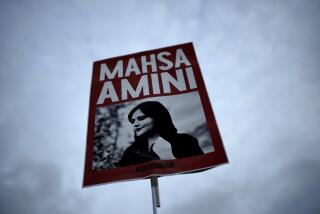Criticism Stalls Trials in Kuwait
- Share via
KUWAIT CITY — Amid international criticism of its treatment of suspected wartime collaborators, a Kuwaiti military tribunal stepped on the brakes Tuesday, postponing trials for 24 people accused of working for a pro-Iraqi newspaper during the occupation of Kuwait.
The Lebanese editor of the newspaper Al Nidaa fled Kuwait with the Iraqis, but he and 23 staff members, all but one of them non-Kuwaitis, are charged with collaborating, accepting payment from the enemy and aiding Iraqi intelligence.
If convicted, they could face death by hanging.
Al Nidaa was the only newspaper permitted to publish in Kuwait during the seven-month Iraqi occupation. It favored large, front-page color photographs of Saddam Hussein, declared Kuwait to be Iraq’s 19th province and served up daily insults to the emir, Sheik Jabbar al Ahmed al Sabah, and his ministers.
In court Tuesday, the defendants proclaimed their innocence. Many said they were forced to work at the newspaper, threatened with deportation to Baghdad or worse.
“I feared for my wife,” said Abdulrahman Hussaini, who said he wrote nonpolitical feature articles for the paper. “I feared I would be tortured, and I feared for my two children.”
Others said they were only janitors, clerks or secretaries. Some denied having worked at the paper at all.
“I would never do anything to harm this country, not after I lived here and my father was buried here,” said Fuwwaz Bassasow, a Palestinian who worked as a copy editor.
Bassasow said he never wrote political articles and, in an act of resistance, slipped into the Dec. 25 newspaper a paragraph from Time magazine that said young Kuwaiti men were arming themselves to fight the Iraqis. As a result, he said, copies of the Dec. 25 edition were recalled from circulation.
“If I’m guilty, answer this: On the 25th of December, why did the Iraqis close the paper?” Bassasow said. “Why were the copies snatched back from the public? Why was I arrested by the Iraqis and interrogated by Iraqi intelligence?”
In contrast to the first trials on Sunday, when the five-judge martial-law panel took less than five hours to convict six Kuwaitis, including a man whose only stated crime was wearing a Saddam Hussein T-shirt, Judge Mohammed Jasem Naji allowed the defendants to deliver long statements to the court.
He then agreed to postpone hearings until June 1 to allow the accused time to prepare a defense.
“Very, very (much) better,” declared defense attorney Emad Saif, who had threatened to withdraw from the case without more due-process guarantees. “He (the judge) didn’t refuse anything we asked him. I can’t comment, but I think maybe something happened.”
In the first of hundreds of collaboration trials Sunday, several defendants said they had been beaten into making false confessions. Others learned of the charges against them for the first time in court, and found their lawyers appointed on the spot. No witnesses were produced to substantiate the charges, prompting one attorney to complain that he was being forced to defend his clients against “ghosts.”
Three Palestinians and one Egyptian were acquitted, but the Iraqi who wore the T-shirt was given a 15-year jail term.
On Monday, both President Bush and the British government expressed concerns about giving the defendants fair trials. State Department spokeswoman Margaret Tutwiler was blunter, saying, “Fifteen years for wearing a T-shirt is pretty steep.”
Apparently stung by the official rebukes and the public-relations black eye Kuwait received in the international press, government sources said Tuesday they are preparing a statement to explain the harsh 15-year sentence against Adnan Abdul Hassan. They said Kuwaiti police also have evidence--not mentioned in court--that Hassan was a longtime Iraqi spy.
“He used to spy on the Kuwaitis by sneaking into the mosques or the diwaniyahs (traditional discussion gatherings),” a Ministry of Information official said, adding that during the occupation, Hassan had also informed on Kuwaiti military officers.
“He wore the T-shirt to provoke Kuwaitis,” he said.
Others said the government had made a point of inviting the media to an open trial and was taken aback by the results.
“I think they were trying hard,” one U.S. diplomat said. “But I got the impression today that they were floored.”
Monitoring Tuesday’s trials were U.S., British and Australian diplomats, the International Red Cross and Amnesty International.
More to Read
Sign up for Essential California
The most important California stories and recommendations in your inbox every morning.
You may occasionally receive promotional content from the Los Angeles Times.











